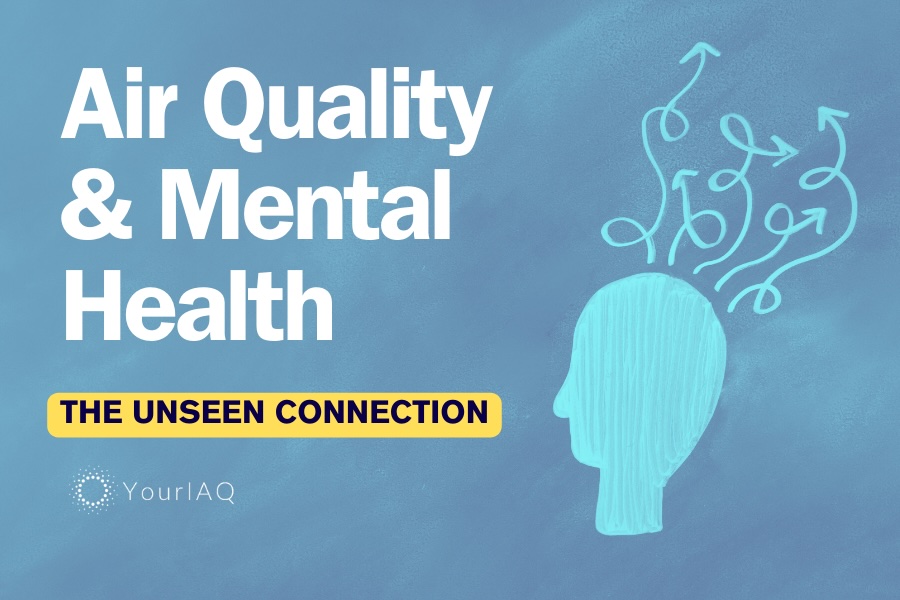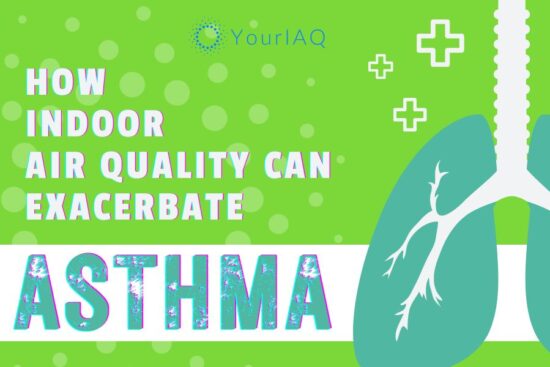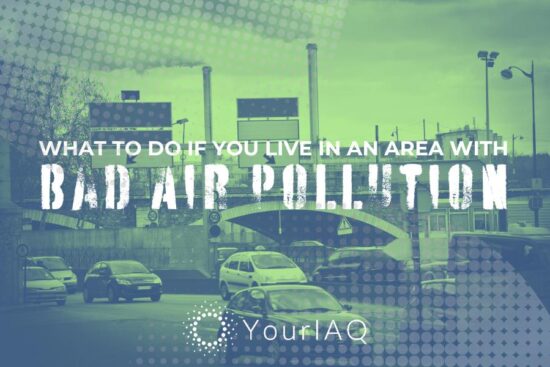
Is there a hidden connection between indoor air quality and mental health? Some research indicates it’s possible. What’s not in dispute is the potential for poor air quality to create a whole litany of health problems. In this article, we’ll dig into the topic and provide an overview on how air quality and mental health correlate.
Overview of Mental Health and Air Quality
Let’s start with a quick primer on mental health. Mental health or mental wellness are general terms that describe the overall psychological well-being of an individual. It’s not merely the absence of mental disorders, but a positive state of mind that enables individuals to manage stress, maintain productive relationships, and make meaningful contributions to their community. The importance of mental wellness cannot be overstated, as it is integral to your quality of life, influencing how you cope with life’s challenges, process emotions, and make decisions.
Indoor air quality is increasingly recognized as a significant factor affecting health and wellness. Common indoor pollutants, such as particulate matter, volatile organic compounds (VOCs), and biological pollutants can contribute to a range of health issues, from respiratory conditions to cardiovascular diseases.
Emerging research suggests a potential link between poor indoor air quality and mental health outcomes. Exposure to pollutants in indoor environments may exacerbate symptoms of mental health conditions such as anxiety and depression, and can impact cognitive functions. Addressing indoor air quality is not only crucial for physical health but also for fostering environments conducive to mental well-being.
Exploring the Science: Impact of Air Quality on Mental Wellness
A number of studies provide evidence of a link between air quality and mental health (see complete list in References below). A 2018 Chinese study highlights a significant correlation between air pollution and an increase in symptoms of anxiety and depression. Similarly, a 2015 American study underscores this link, particularly noting an increased risk of depression among older women exposed to particulate matter.
There’s also been a notable rise in psychiatric outpatient visits in urban areas correlating with higher levels of air pollution, suggesting an immediate impact on mental health. We’ve previously reviewed the link between indoor air quality and risk of dementia in a past blog article.
Meanwhile a comprehensive review by the Forum of International Respiratory Societies points out the broader impact of air pollution on various organ systems, including potential exacerbation of mental health conditions. Finally, a Danish study focusing on adolescents indicates that long-term exposure to air pollution during childhood is associated with a higher risk of developing psychiatric disorders in adolescence.
Collectively, these studies underscore the growing concern that air pollution not only affects physical health but also has a profound impact on mental well-being, highlighting the need for more stringent air quality controls and further research in this area.
Mechanisms Behind the Connection
In exploring the connection between mental health and air quality, it’s crucial to delve into the biological and neurological pathways that are influenced by air pollutants. Exposure to pollutants like particulate matter (PM), nitrogen dioxide (NO2), and sulfur dioxide (SO2) can have direct and indirect effects on the brain.
Directly, these pollutants can cause neuroinflammation and oxidative stress, leading to neuronal damage. Indirectly, they can alter the regulation of blood flow to the brain and disrupt the blood-brain barrier, a crucial defense mechanism that protects the brain from harmful substances.
Direct Connections
These changes are particularly concerning because they can affect areas of the brain associated with emotion regulation and cognitive functions, potentially leading to or exacerbating mental health issues such as anxiety, depression, and cognitive decline.
Furthermore, there is evidence suggesting that exposure to air pollution during critical developmental periods, such as childhood or adolescence, can have long-lasting effects on brain health and development, thereby increasing the risk of psychiatric disorders later in life.
The role of inflammation and oxidative stress in this context is significant. Inflammation is the body’s natural response to harmful stimuli. But chronic inflammation, often triggered by prolonged exposure to air pollutants, can be detrimental to brain health. This chronic inflammatory state can lead to an overproduction of reactive oxygen species (ROS), causing oxidative stress which damages cells and tissues, including neurons. This process can contribute to the development and progression of various neurological and psychiatric disorders.
Indirect Connections
Additionally, the psychological stressors related to environmental concerns cannot be overlooked. Living in areas with poor air quality can create a constant state of worry and anxiety about one’s health and the health of loved ones. This anxiety, coupled with the direct effects of pollutants on the brain, creates a compounded risk for mental health issues. People may feel a lack of control over their environment and future, which can exacerbate feelings of stress and helplessness, further impacting mental well-being.
Mitigating the Effects of Poor Air Quality on Mental Health
Improving indoor air quality is a vital step in mitigating the negative impact of air pollution on mental health. Here are some easy suggestions for addressing indoor air quality:
Proper ventilation
This can be as simple as opening windows to allow fresh air circulation, or using exhaust fans in areas like kitchens and bathrooms to reduce humidity and remove indoor pollutants.
Regular maintenance of HVAC systems
Making sure your HVAC system is operating efficiently, including replacing filters regularly, can help you control the climate inside your home and ensure you aren’t trapping pollutants inside or creating unhealthy emissions.
Air quality monitors
In order to best address air quality problems, you need to have a good understanding of what pollutants you’re up against. An indoor air quality monitor can provide invaluable data about what you’re breathing, and help you create a more effective strategy to manage your air.
Indoor plants
Spider plants, peace lilies, and snake plants can naturally filter certain pollutants from the air. Plants are not only natural air purifiers but are also aesthetically pleasing and can increase a sense of satisfaction.
Mechanical air purifiers
AIr purifiers equipped with HEPA filters can significantly reduce the concentration of airborne particulates and allergens inside homes and workplaces.
Lifestyle adjustments
How you live and what products you consume can play a crucial role in minimizing exposure to poor air quality. Some thought starters include: checking air quality forecasts, getting outside routinely, avoiding smoking, buying non-toxic household goods, and reducing the use of volatile organic compounds (VOCs) in cleaning and personal care products.
Conclusion
The intricate relationship between indoor air quality and mental health is an emerging field of study that requires more attention. While the physical health effects of poor air quality are already well-documented, the mental wellness connections is becoming increasingly evident. Studies show a significant correlation between exposure to air pollutants and worsening mental health conditions. These conditions include anxiety, depression, and cognitive decline.
Addressing indoor air quality, therefore, emerges as a matter of both physical health and mental wellness. By adopting measures to manage and improve indoor air quality, you can take proactive steps towards creating a healthier indoor environment.
References and Research
| Title of Study | Link | Year Published |
| “Air pollution and mental health: evidence from China” | Link | 2018 |
| “The Association Between Air Pollution and Onset of Depression Among Middle-Aged and Older Women” | Link | 2015 |
| “Association of Urban Air Pollution with Psychiatric Outpatient Visits in Shanghai, China” | Link | 2019 |
| “Air Pollution and Noncommunicable Diseases: A Review by the Forum of International Respiratory Societies’ Environmental Committee” | Link | 2019 |
| “Long-term exposure to ambient air pollution and mental health in adolescents: the Danish Nurse Cohort Study” | Link | 2017 |








Comments (84)
is bactrim stronger than keflexsays:
February 10, 2024 at 8:08 pmis bactrim stronger than keflex
is bactrim stronger than keflex
duloxetine for pain reviewssays:
February 11, 2024 at 12:43 amduloxetine for pain reviews
duloxetine for pain reviews
gabapentin lortabsays:
February 13, 2024 at 4:56 pmgabapentin lortab
gabapentin lortab
sildenafil from mexicosays:
February 14, 2024 at 3:45 pmsildenafil from mexico
sildenafil from mexico
fluoxetine and breastfeedingsays:
February 15, 2024 at 12:44 amfluoxetine and breastfeeding
fluoxetine and breastfeeding
can i drink alcohol while taking cephalexinsays:
February 28, 2024 at 8:47 amcan i drink alcohol while taking cephalexin
can i drink alcohol while taking cephalexin
doxycycline vs amoxicillinsays:
March 22, 2024 at 5:11 amdoxycycline vs amoxicillin
doxycycline vs amoxicillin
does neurontin lower blood pressuresays:
March 22, 2024 at 7:00 amdoes neurontin lower blood pressure
does neurontin lower blood pressure
ddavp for bedwetting dosagessays:
March 22, 2024 at 9:59 amddavp for bedwetting dosages
ddavp for bedwetting dosages
what are the side effects of ezetimibesays:
March 22, 2024 at 7:06 pmwhat are the side effects of ezetimibe
what are the side effects of ezetimibe
flomax side effects dizzinesssays:
March 22, 2024 at 8:13 pmflomax side effects dizziness
flomax side effects dizziness
what helps with withdrawal symptoms from citalopramsays:
March 22, 2024 at 10:48 pmwhat helps with withdrawal symptoms from citalopram
what helps with withdrawal symptoms from citalopram
buspar high feelingsays:
March 28, 2024 at 12:07 pmbuspar high feeling
buspar high feeling
how much ashwagandha should i takesays:
March 28, 2024 at 3:20 pmhow much ashwagandha should i take
how much ashwagandha should i take
intrathecal baclofensays:
March 28, 2024 at 9:00 pmintrathecal baclofen
intrathecal baclofen
taking bupropion and naltrexone instead of contrave reviewssays:
March 28, 2024 at 11:09 pmtaking bupropion and naltrexone instead of contrave reviews
taking bupropion and naltrexone instead of contrave reviews
actos yasakland脹says:
April 14, 2024 at 1:26 amactos yasakland脹
actos yasakland脹
does effexor cause hair losssays:
April 14, 2024 at 4:02 amdoes effexor cause hair loss
does effexor cause hair loss
amitriptyline side effectssays:
April 14, 2024 at 7:06 amamitriptyline side effects
amitriptyline side effects
acarbose ratiopharmsays:
April 14, 2024 at 11:40 amacarbose ratiopharm
acarbose ratiopharm
does robaxin have aspirin in itsays:
April 14, 2024 at 1:23 pmdoes robaxin have aspirin in it
does robaxin have aspirin in it
raw supplements semaglutidesays:
April 14, 2024 at 8:54 pmraw supplements semaglutide
raw supplements semaglutide
amlodipine vs diltiazemsays:
April 15, 2024 at 2:58 amamlodipine vs diltiazem
amlodipine vs diltiazem
protonix and dementiasays:
April 19, 2024 at 5:36 amprotonix and dementia
protonix and dementia
spironolactone joint pain redditsays:
April 19, 2024 at 3:12 pmspironolactone joint pain reddit
spironolactone joint pain reddit
can i take aleve with oral voltarensays:
April 19, 2024 at 7:10 pmcan i take aleve with oral voltaren
can i take aleve with oral voltaren
glipizide and repaglinidesays:
April 20, 2024 at 12:30 pmglipizide and repaglinide
glipizide and repaglinide
ivermectin pricesays:
April 21, 2024 at 7:10 amivermectin price
ivermectin price
levitra cheapest onlinesays:
May 13, 2024 at 3:46 amlevitra cheapest online
levitra cheapest online
tadalafil (tadalis-ajanta)says:
May 13, 2024 at 3:14 pmtadalafil (tadalis-ajanta)
tadalafil (tadalis-ajanta)
buy viagra for female onlinesays:
May 17, 2024 at 3:29 ambuy viagra for female online
buy viagra for female online
ivermectin usa pricesays:
May 17, 2024 at 3:49 amivermectin usa price
ivermectin usa price
ivermectin generic namesays:
May 17, 2024 at 8:25 amivermectin generic name
ivermectin generic name
cheapest tadalafil indiasays:
May 17, 2024 at 10:38 amcheapest tadalafil india
cheapest tadalafil india
stromectol where to buysays:
May 17, 2024 at 6:41 pmstromectol where to buy
stromectol where to buy
buy ivermectin pillssays:
May 17, 2024 at 6:52 pmbuy ivermectin pills
buy ivermectin pills
what question should the nurse ask when assessing for therapeutic effects of vardenafil?says:
May 18, 2024 at 5:16 amwhat question should the nurse ask when assessing for therapeutic effects of vardenafil?
what question should the nurse ask when assessing for therapeutic effects of vardenafil?
ivermectin tablets uksays:
May 18, 2024 at 11:44 amivermectin tablets uk
ivermectin tablets uk
prednisone for sinus infectionsays:
June 26, 2024 at 6:08 amprednisone for sinus infection
prednisone for sinus infection
pregabalin abusesays:
June 26, 2024 at 12:54 pmpregabalin abuse
pregabalin abuse
doxycycline hyclate with alcoholsays:
June 26, 2024 at 5:30 pmdoxycycline hyclate with alcohol
doxycycline hyclate with alcohol
how long does cephalexin take to worksays:
June 26, 2024 at 5:51 pmhow long does cephalexin take to work
how long does cephalexin take to work
metformin pillssays:
June 26, 2024 at 8:25 pmmetformin pills
metformin pills
is 2.5 mg lisinopril a low dosesays:
June 26, 2024 at 8:58 pmis 2.5 mg lisinopril a low dose
is 2.5 mg lisinopril a low dose
amoxicillin clavulanic acidsays:
June 29, 2024 at 5:15 amamoxicillin clavulanic acid
amoxicillin clavulanic acid
ciprofloxacin eye drops side effectssays:
June 30, 2024 at 6:50 amciprofloxacin eye drops side effects
ciprofloxacin eye drops side effects
tamoxifen vs raloxifenesays:
July 23, 2024 at 9:48 amtamoxifen vs raloxifene
tamoxifen vs raloxifene
levitra goodrxsays:
December 20, 2024 at 7:07 amlevitra goodrx
levitra goodrx
viagra effects on womensays:
December 20, 2024 at 10:27 amviagra effects on women
viagra effects on women
what is tadalafil used forsays:
December 20, 2024 at 11:50 amwhat is tadalafil used for
what is tadalafil used for
sildenafil citrate over the countersays:
December 20, 2024 at 8:13 pmsildenafil citrate over the counter
sildenafil citrate over the counter
expired sildenafilsays:
December 21, 2024 at 1:32 amexpired sildenafil
expired sildenafil
buy levitra without prescriptionsays:
December 22, 2024 at 12:59 pmbuy levitra without prescription
buy levitra without prescription
levitra 20 mgsays:
December 23, 2024 at 4:11 amlevitra 20 mg
levitra 20 mg
can you take levitra and viagra togethersays:
December 23, 2024 at 4:22 amcan you take levitra and viagra together
can you take levitra and viagra together
vardenafil citratesays:
December 23, 2024 at 11:47 pmvardenafil citrate
vardenafil citrate
sildenafil 50 mg para que sirvesays:
December 24, 2024 at 1:08 amsildenafil 50 mg para que sirve
sildenafil 50 mg para que sirve
kroger pharmacysays:
December 24, 2024 at 5:46 amkroger pharmacy
kroger pharmacy
pharmacy consumer tramadolsays:
December 24, 2024 at 10:56 ampharmacy consumer tramadol
pharmacy consumer tramadol
generic tadalafil 20mg pricesays:
December 25, 2024 at 2:10 amgeneric tadalafil 20mg price
generic tadalafil 20mg price
pharmacy cost of oxycodonesays:
December 25, 2024 at 3:24 ampharmacy cost of oxycodone
pharmacy cost of oxycodone
tadalafil dosagessays:
December 25, 2024 at 4:51 amtadalafil dosages
tadalafil dosages
can you cut tadalafil in halfsays:
December 25, 2024 at 5:22 amcan you cut tadalafil in half
can you cut tadalafil in half
vardenafil bodybuildingsays:
December 25, 2024 at 9:16 pmvardenafil bodybuilding
vardenafil bodybuilding
sulfasalazine for diarrheasays:
December 27, 2024 at 9:35 amsulfasalazine for diarrhea
sulfasalazine for diarrhea
celebrex and macular degenerationsays:
December 27, 2024 at 10:24 pmcelebrex and macular degeneration
celebrex and macular degeneration
celecoxib grupo farmacologicosays:
December 28, 2024 at 3:58 amcelecoxib grupo farmacologico
celecoxib grupo farmacologico
reacciones adversas del mestinonsays:
December 30, 2024 at 3:33 pmreacciones adversas del mestinon
reacciones adversas del mestinon
diclofenac er 100 mgsays:
December 30, 2024 at 3:42 pmdiclofenac er 100 mg
diclofenac er 100 mg
can mebeverine make you tiredsays:
December 30, 2024 at 10:47 pmcan mebeverine make you tired
can mebeverine make you tired
can you buy generic pyridostigmine without a prescriptionsays:
December 31, 2024 at 6:22 amcan you buy generic pyridostigmine without a prescription
can you buy generic pyridostigmine without a prescription
para que sirve cilostazolsays:
December 31, 2024 at 8:14 ampara que sirve cilostazol
para que sirve cilostazol
generic imdursays:
January 7, 2025 at 11:56 amgeneric imdur
generic imdur
allopurinol interaction azathioprinesays:
January 7, 2025 at 12:24 pmallopurinol interaction azathioprine
allopurinol interaction azathioprine
mobic time of daysays:
January 7, 2025 at 1:15 pmmobic time of day
mobic time of day
baclofen patient commentssays:
January 7, 2025 at 1:34 pmbaclofen patient comments
baclofen patient comments
what is the difference between sumatriptan and rizatriptansays:
January 7, 2025 at 1:41 pmwhat is the difference between sumatriptan and rizatriptan
what is the difference between sumatriptan and rizatriptan
meloxicam morbus crohnsays:
January 7, 2025 at 9:38 pmmeloxicam morbus crohn
meloxicam morbus crohn
can you take sumatriptan with lexaprosays:
January 8, 2025 at 1:27 amcan you take sumatriptan with lexapro
can you take sumatriptan with lexapro
where can i get ketorolac without prescriptionsays:
January 9, 2025 at 4:49 amwhere can i get ketorolac without prescription
where can i get ketorolac without prescription
can i get generic toradol without dr prescriptionsays:
January 9, 2025 at 5:43 amcan i get generic toradol without dr prescription
can i get generic toradol without dr prescription
difference between zanaflex and xanaxsays:
January 9, 2025 at 6:41 amdifference between zanaflex and xanax
difference between zanaflex and xanax
periactin oral solutionsays:
January 9, 2025 at 8:03 amperiactin oral solution
periactin oral solution
cost of cyproheptadinesays:
January 9, 2025 at 8:10 amcost of cyproheptadine
cost of cyproheptadine